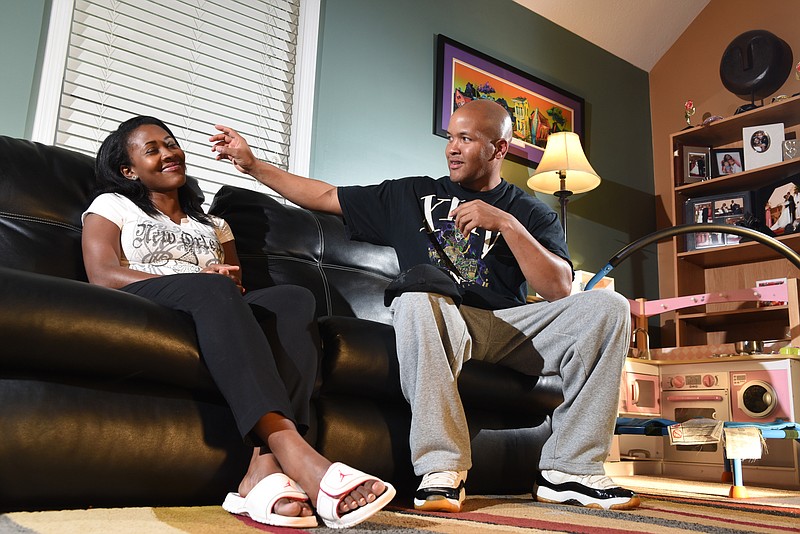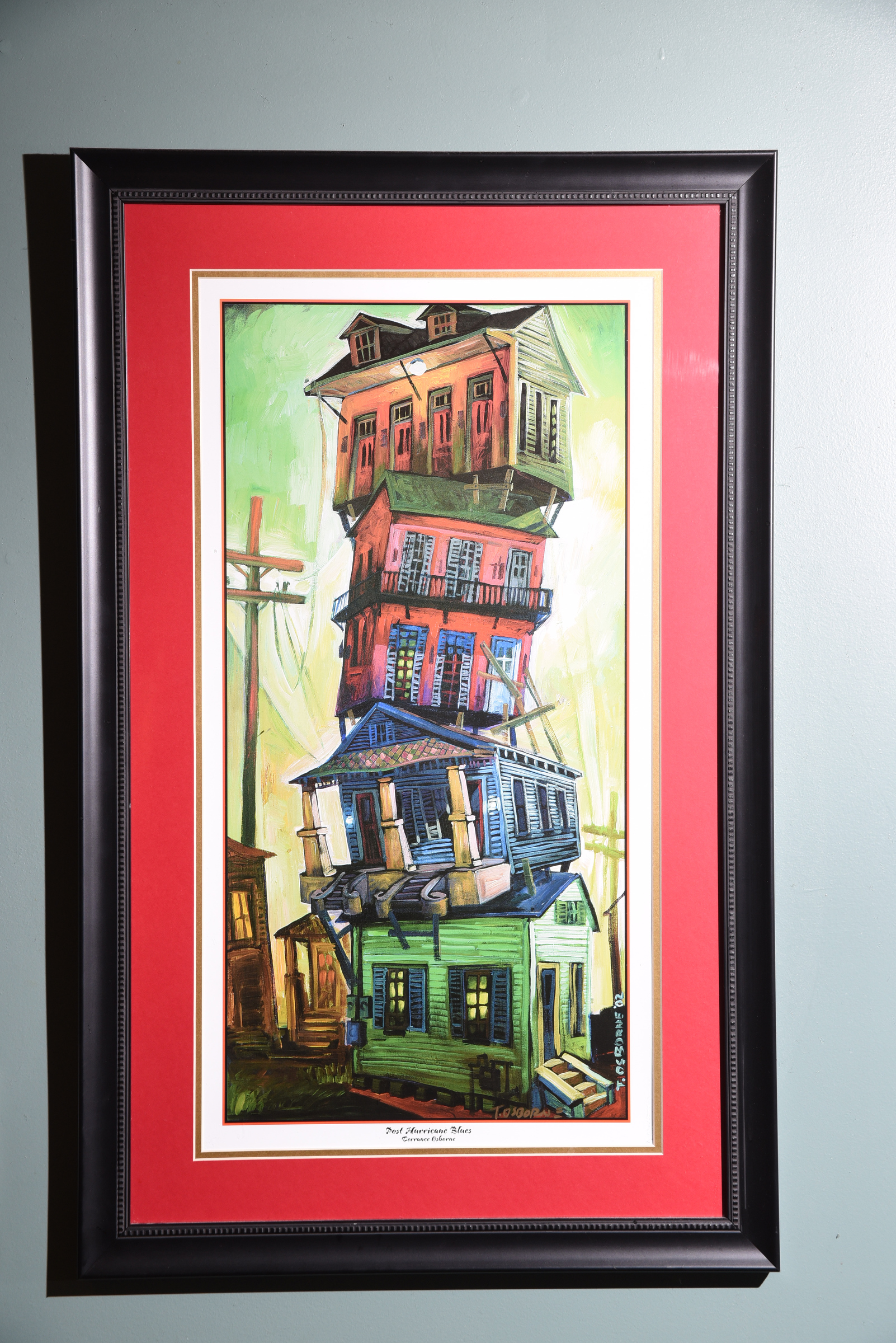One day before Hurricane Katrina destroyed his city, Jacques Irvin rode in his father's Ford Expedition, hoping to head west.
West meant California. It meant the sun. It meant a vacation. But the men on the radio told listeners not to bother. Cars with Louisiana license plates choked the westbound lanes of Interstate 10. Take that route and the Irvins might never get out of town.
So Irvin, his parents and seven other family members steered their caravan east. They didn't know where they were going. But his brother in Baltimore called every hotel along the highway, looking for a place for them to stay. Finally, he found vacancies at the Econo Lodge in East Ridge.
"Where?" Irvin asked his brother.
It didn't matter. The storm looked big on TV, but they always looked big - and they almost always passed. And even when they hit, even when the rainwater leaked into the house and the power cut off, the neighbors held parties. They swam and ate and laughed. This was New Orleans.
While Irvin's family drove away from town, Dwight Douglas had already made the journey from New Orleans to his sister's house in East Brainerd.
Cherita Adams, meanwhile, was driving to her brother-in-law's house in Chattanooga, thinking about the storm's path through Florida, thinking, "Something's wrong when a storm doesn't die."
Anthony Pollard was listening to his nephew tell him about a dream, about how he was sitting in the back seat of his car, their hometown in a rearview mirror.
They drove east, and Pollard's sister opened an atlas. The first page they saw was Tennessee, and they figured the Volunteer State was as good a place as any.
Adams, Douglas, Irvin and Pollard all prepared for a week-long trip. They had no idea how Katrina would devastate their hometown, how their own lives would change. When the storm hit, 10 years ago today, they could not have predicted how their arbitrary decisions to stop in the Chattanooga area would change their lives.
The people of Chattanooga, likewise, couldn't have predicted how their own city would change.
It's hard to know how many people came here because of the storm. According to Hamilton County Emergency Services, about 200 evacuees were transported to Chattanooga, some of them on a plane chartered by former Vice President Al Gore. But that number doesn't include people who drove here before the storm hit. County officials also have not tracked how many remain here a decade later.
Regardless of the number of New Orleans evacuees now in Chattanooga, the group that came has touched the city.
Adams and her husband opened Blue Orleans on the corner of Main and Market streets.
Douglas' wife became a teacher at Our Lady of Perpetual Help.
Pollard became the youth pastor at Olivet Baptist Church.
Irvin, meanwhile, met a woman two weeks after the storm. She seemed graceful, intelligent; the type who could keep a boy from New Orleans calm.
"The creepiest thing I had ever seen"
Hours after the storm landed, the Katrina evacuees realized they would have to stay in Chattanooga longer than they anticipated. But for Cherita and Mike Adams, their first trip back to New Orleans showed them that they needed to stay here.
On Oct. 13, 2005, the first day residents were allowed back in their homes, the Adamses could barely recognize their street. The flowers were gone; the grass was gray. They could hear a series of shrieks, falling like dominoes, from one house to the next.
When she walked inside, Cherita Adams' voice joined the chorus. Her home was like a twisted Dr. Seuss setting. The water had warped and swelled the furniture to the point it looked like giant sponges. Strips of carpet stood vertical, from floor to ceiling, twisted like dish rags. Canvases hung blank on the walls, their color drained somewhere.
And the walls themselves: They were covered in mold. Green mold. Brown mold. Purple mold. Orange mold. All of it suffocating the walls. Branches of mold extended into the middle of the rooms, like fingers.
"It was moving," Cherita said. "Living, breathing mold."
"It was the creepiest thing I had ever seen," Mike said.
Their children were 1 and 3 years old at the time, and they decided that the challenge of raising children while helping rebuild a city would be too great.
Douglas saw a similar nightmare back home. Cars flipped on the sides of roads. Mud caked throughout the home. Ceiling fan blades drooping, like weeds.
"It was worse off than what I saw in the war," said Douglas, a Gulf War veteran. "It really looked like a Third World country after the storm. If I could put my kids in good schools (in Chattanooga), why would I bring them back?"
Staying here
Irvin, meanwhile, had no children to worry about. He was 24 when the storm hit. And New Orleans was his town. His father owned a restaurant, a grocery store, a bar.
New Orleans meant parades, red beans and rice, musicians playing their brass instruments on the corner just because it was Wednesday. But then a woman invited his family to Greater Tucker Baptist Church. And another woman at the fellowship hall introduced him to her niece, Tenesha.
This woman seemed different than what he was used to. She was smart and liked history. She drove him up Lookout Mountain and showed him the valley. Irvin thought about Martin Luther King's "I Have a Dream" speech.
"I see why he preached about this," he said. "It's beautiful."
He, too, seemed different. He was confident, and he wanted you to know he was confident. But he was also a gentleman, carrying bags and holding doors and telling her she was pretty, every time he saw her.
Two years after Katrina, the Irvins got married.
Today, they have a son and a daughter, and Irvin works for EPB. He still misses New Orleans, and his passion for the city has grown. Even now, when he goes out with his wife, he wants her to know that back home the music sounds better, the food tastes better and the bars stay open later.
Part of his New Orleans bravado, he admits, comes from insecurity. The town still hasn't recovered. And many people left for good - in particular, members of the black middle class.
Of the 175,000 black residents who left before Katrina, according to a 2013 American Community Survey, about 80,000 of them never came back. Compared to 2005, black residents in New Orleans are less likely to be working and more likely to be living in poverty.
Irvin knows this. When he watches documentaries of the storm, he weeps. And when he thinks about something positive since the storm, like when the Saints won the Super Bowl in 2010, he cries some more - because at least now the city can feel proud about something again.
The city sank, and he didn't return. But he believes his life's path is divine, that he came to Chattanooga to meet his wife. And he's not going to question the reasons for everything that happened to bring him here.
"He sent us east," Irvin said.
"It was a blessing in the storm," Tenesha said. "Never would our paths have crossed if it wasn't for Katrina."
The Irvins celebrated their eighth anniversary last week. This time, Jacques didn't have to worry about traffic.
He traveled west.
Contact Staff Writer Tyler Jett at tjett@timesfreepress.com or at 423-757-6476.

